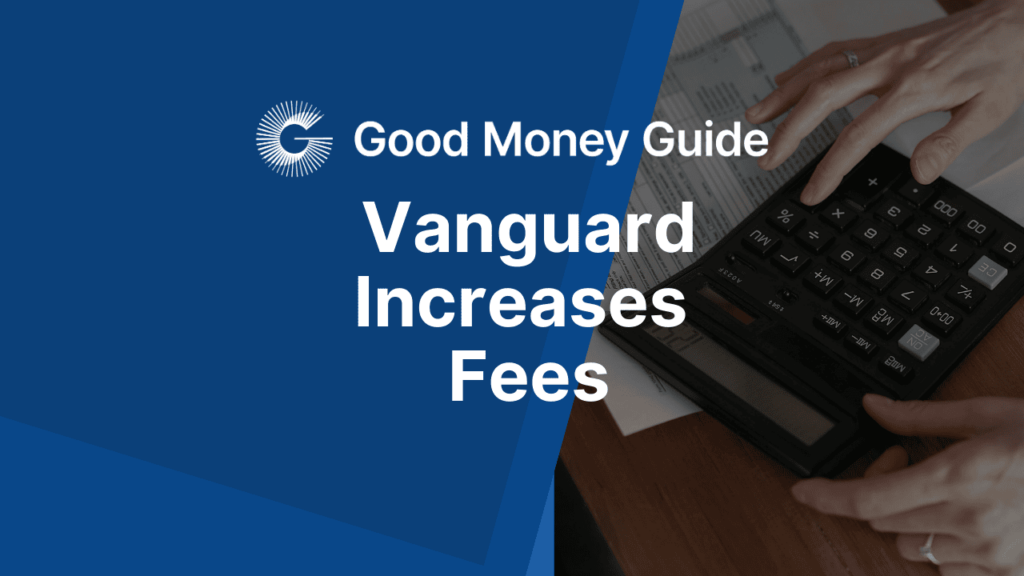Vanguard UK is set to introduce an account fee of £4 a month for “DIY” customers who choose their own investments on its platform.
The new Vanguard £4 monthly fee will apply to customers with up to £32,000 invested across ISAs, personal pensions and general investment accounts from 31 January 2025.
Investors are currently charged 0.15% a year below this amount. This fee still applies to balances over £32,000, with total account fees capped at £375 per year across wrappers.
So, for example, someone who has invested £10,000 in their own choice of ETFs through the platform will pay an account fee of £48 (£4X 12) per year, as opposed to the £15 (0.15% of £10,000) they pay currently. This calculation does not include additional fees such as underlying fund costs or dealing charges.
This is a significant change. The incoming DIY account fee is still fairly competitive with those of other major platforms, yet there are also lower-cost alternatives.
These include AJ Bell’s simplified investing app Dodl, which charges 0.15% of the value of investments in an account per year, paid monthly – the same as Vanguard’s current DIY fee.
As part of the changes, Vanguard will also cut a third off the fee on its “managed” Individual Savings Account (ISA), in which a portfolio of funds is selected by the firm on behalf of customers.
The management fee for this service will be reduced to 0.20% per year from the current level of 0.3%, regardless of assets invested. The managed service also carries an account fee of 0.15%, capped at £375, as well as average underlying fund costs (which can vary) of 0.17%.
All in all, this comes to around 0.52% of assets per year – at about half the starting point of the fees of the main UK robo-advisers Nutmeg and Moneyfarm, which are tiered.
New lower cost entrants to this space are emerging, though they typically offer a smaller range of securities and services, and are less well-established as businesses, which some prospective customers may view as a risk.
One of these, Exchange Traded Fund (ETF) platform Investengine, recently launched a suite of five fully managed investment portfolios with a yearly management fee of just 0.25%, not including the cost of underlying ETFs. It does not charge account fees, but funds its operations through taking all interest on uninvested cash in its users’ accounts.
It is clear Vanguard is trying to incentivise investors with relatively small amounts of assets on their platform to either move these into its managed service or top up their holdings.
In comments to the Financial Times (FT), the firm’s head of UK personal investor Ben Summers said the move was intended to give investors a “helping hand to manage and grow their money”.
“We’ve found that once people have made the important decision to start investing, they can lack confidence in the management of their investments, hold too much cash, and have trouble constructing portfolios with the right funds and level of risk.”
Vanguard also told the FT the move was aimed at covering the “rising cost” of servicing customers who choose their own investments.
Investor reaction
The announcement of the new Vanguard £4 monthly fee was met with anger in the comment sections of major newspapers from people claiming to hold accounts with the firm in the UK.
“So unfair, what’s the point to stay with Vanguard when you can buy the same ETFs on other free platforms or cheaper ones,” one Daily Mail reader wrote.
Industry observers were more understanding of the decision, however, with CEO of wealth consultancy Platforum Jeremy Fawcett suggesting on LinkedIn that investors should consider the whole proposition of a platform, not just its fees.
“Sometimes what’s missing from the discussion is the benefit of the right mix of cost, flexibility and service… aka value,” he said.
“Low-cost is important but not at all costs. Investor needs often get more complicated over time and that’s where flexibility and service really kick in.”
Vanguard’s UK platform passed 600,00 customers this year, so it is likely a lot of people are likely to be impacted by the changes.
The Good Money Guide’s review of the platform notes it offers “a lot of options” to investors, though when it comes to investing larger amounts of money big rivals such as Hargreaves Lansdown and Interactive Investor can be cheaper due to their differing fee models.
This depends on how frequently changes are made to a portfolio, as its transaction costs are comparatively low and it has no fund entry or exit charges.

Robin has more than six years of experience as a financial journalist, most of which were spent at Citywire, and covers the latest developments in the investing, trading and currency transfer space. Outside of work, he enjoys reading literature and philosophy and playing the piano.
You can contact Robin at robin@goodmoneyguide.com



